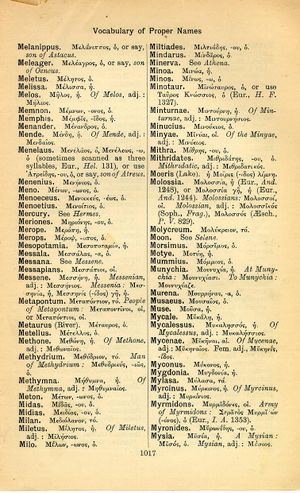Mithridates
θοῦ, Κύριε, φυλακὴν τῷ στόµατί µου καὶ θύραν περιοχῆς περὶ τὰ χείλη µου → set a guard over my mouth, Lord; keep watch over the door of my lips | set a guard, O Lord, over my mouth; keep watch over the door of my lips (Psalm 140:3, Septuagint version)
English > Greek (Woodhouse)
Μιθριδάτης, -ου, ὁ.
Mithridatic, adj.: Μιθριδατικός.
Latin > English (Lewis & Short)
Mĭthrĭdātes: is (dat. -dati, Gell. 15, 1, 6), m., = Μιθριδάτης.
I Mithridates the Great, king of Pontus, who waged war with the Romans, was at last conquered by Pompey, and stabbed himself, Cic. Ac. 2, 1, 3; id. Mur. 15, 32 sq.; id. Agr. 2, 19, 52; id. Fl. 24, 57; 25, 59 sq.; Plin. 25, 2, 3, § 5; Val. Max. 1, 8 ext. 13; 3, 7, 8. He eārly fortified himself against poison by taking antidotes; hence, profecit poto Mithridates saepe veneno, Toxica ne possent saeva nocere sibi, Mart. 5, 76 (cf.: antidotum Mithridatium, Plin. 29, 1, 8, § 24); Cels. 5, 23, 3; Juv. 14, 252.—
II A witness against Flaccus, Cic. Fl. 17, 41.—
III A king of Pergamos, a friend of Cæsar, Auct. B. Alex. 26.—
Surnamed Euergetes, an ally of the Romans against Carthage, Just. 37.—
The fifth king of the Parthians, the most powerful of all the Parthian kings, Just. 41.—
The eighth king of the Parthians, Just. 42, 2.—
A king of Armenia, Tac. A. 11, 8 sq.; 12, 45 sq.—Hence,
A Mĭthrĭ-dātēus, a, um, adj. (Mĭthradātīum, Plin. 29, 1, 8, § 24; Scrib. 194), of or belonging to a Mithridates (poet.): nomina, Ov. M. 15, 755: vultus, Manil. 5, 515: herba, Plin. 25, 6, 26, § 62: antidotus celebratissima quae Mithridatios vocatur, Gell. 17, 16, 6.—Subst.: Mĭthrĭdātīum, ii, n., an antidote, Cael. Aur. Tard. 4, 1, 12.—
B Mĭ-thrĭdātĭcus, a, um, adj., of or belonging to Mithridates, Mithridatic (class.): bellum, Cic. Imp. Pomp. 3, 7 (v. Mithridates, I.): victoria, over Mithridates, Plin. 15, 25, 30, § 102: crimen, of the witness Mithridates, Cic. Fl. 17, 41.
Latin > French (Gaffiot 2016)
Mĭthrĭdātēs,⁹ is, m. (Μιθριδάτης), Mithridate [roi du Pont] : Cic. Ac. 2, 3 ; Mur. 32

